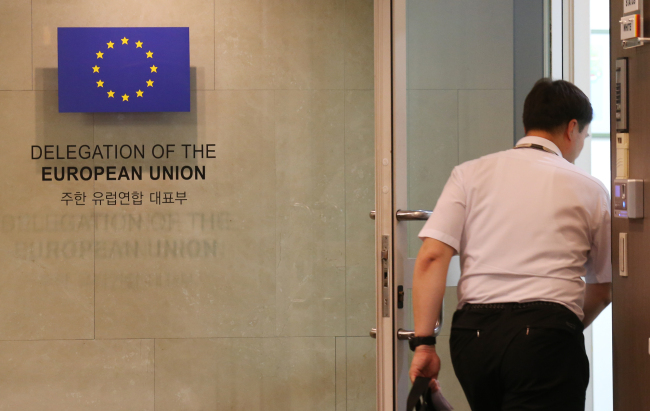Brexit to have limited impact on Korean legal market: experts
By Ock Hyun-juPublished : June 26, 2016 - 17:35
While South Korea scrambled to assess the impact of Great Britain’s decision to leave the European Union over the weekend, little impact will be made on its domestic legal market, experts said Sunday.
The “Brexit” decision came amid the U.K. law firms’ ongoing efforts to cement their standing in South Korea, with the final stage of opening the local legal industry to come into effect on July 1 under the Korea-EU free trade deal.
Experts and government officials noted that Brexit would not affect British law firms’ standing in South Korea.
It is expected to take at least two years for Britain to negotiate terms and conditions with the 28-member bloc before it eventually exits the union. Until then, the U.K. will maintain its legal status as a member of the EU in Korea, a law professor said.
The “Brexit” decision came amid the U.K. law firms’ ongoing efforts to cement their standing in South Korea, with the final stage of opening the local legal industry to come into effect on July 1 under the Korea-EU free trade deal.
Experts and government officials noted that Brexit would not affect British law firms’ standing in South Korea.
It is expected to take at least two years for Britain to negotiate terms and conditions with the 28-member bloc before it eventually exits the union. Until then, the U.K. will maintain its legal status as a member of the EU in Korea, a law professor said.

“Brexit will prompt Korea and the U.K. to reopen free trade negotiations. But for now, it won’t affect the British law firms in the country, as Britain still has two years to pull out of EU,” Kim Sang-kyum, law professor at Dongguk University, told The Korea Herald.
“South Korea’s legal market is relatively small in size and so far, it has mostly been the U.S. law firms who found reason to enter it, so the impact of Brexit will be limited,” he said. “Meanwhile, the Justice Ministry and the legal market should evaluate the impact of Brexit and prepare themselves to minimize the fallout.”
As Korea agreed to fully open its market to the EU by July 2016 and the U.S. by March 2017, the Justice Ministry proposed a revised draft of the Foreign Legal Consultant Act last August to implement the final stage of legal market liberalization under the free trade agreements with the countries.
Under the revised bill, the foreign law firms are allowed to set up joint ventures with Korean counterparts, hire Korean lawyers and partially practice domestic law as the final step. But they are banned from representing clients in Korean courtrooms, owning greater stake than the Korean firm in the joint venture or from handling domestic cases related to labor, inheritance and government affairs.
A total of 26 law firms from the U.S. and U.K. have opened their offices in Seoul since the trade deals came into effect in 2011 and 2012, respectively, with most of them focusing on offering legal advice for mergers and acquisitions, intellectual property, initial public offerings and cross-border litigation.
Though the official figure is not available, the foreign law firms take up an estimated half of the legal consulting market.
So far, five EU law firms -- Clifford Chance, Allen & Overy, Herbert Smith Freehills, Stephenson Harwood and Linklaters -- have set up operations in Korea. All of them are from the U.K.
“I seriously doubt the eventual implementation of Brexit will cause any major legal firms to leave Korea,” said Britt Frey, an American doctor of law who is residing in Seoul and familiar with the matter. “If anything, Brexit will cause an increase in business for U.K. firms here as much more research will need to be done regarding export, import and M&A between the U.K. and Korea.”
Kim Kyung-hwa, head of Stephenson Harwood’s Korea branch, told Yonhap News Agency that he expects the two countries to find a way for the next two years. “As the core of the opening of the legal market under the South Korea-EU FTA is the U.K., there will be no turning back in terms of the bilateral relations.”
An official from the Justice Ministry said that Great Britain’s status as a free trade partner would not likely change.
“The ministry would have to review the U.K.’s legal status after its exit from the EU, but I expect that the U.K. would still enjoy the benefits of the FTA reached (when part of the) EU,” he said. “Korea and the U.K. will launch a talk on clinching a new FTA or add the country to the South Korea-EU FTA while the U.K. conducts negotiations to leave the EU in the coming years.”
U.K. Ambassador to Korea Charles Hay also said in an interview with a local news outlet following the referendum that Britain’s relationship with Korea will not change in the near future. But it would need a bilateral free trade agreement to replace the South Korea-EU free trade pact that took effect in 2011.
“Fundamentally, I hope that this won’t change because the fundamental policies of the U.K. have not changed,” he said. “We will continue to be an outward-looking trading nation. We want to have a very strong trade and investment relationship with Korea.”
By Ock Hyun-ju (laeticia.ock@heraldcorp.com)
-
Articles by Ock Hyun-ju








![[Graphic News] More Koreans say they plan long-distance trips this year](http://res.heraldm.com/phpwas/restmb_idxmake.php?idx=644&simg=/content/image/2024/04/17/20240417050828_0.gif&u=)
![[KH Explains] Hyundai's full hybrid edge to pay off amid slow transition to pure EVs](http://res.heraldm.com/phpwas/restmb_idxmake.php?idx=644&simg=/content/image/2024/04/18/20240418050645_0.jpg&u=20240419100350)






![[From the Scene] Monks, Buddhists hail return of remains of Buddhas](http://res.heraldm.com/phpwas/restmb_idxmake.php?idx=652&simg=/content/image/2024/04/19/20240419050617_0.jpg&u=20240419175937)

![[KH Explains] Hyundai's full hybrid edge to pay off amid slow transition to pure EVs](http://res.heraldm.com/phpwas/restmb_idxmake.php?idx=652&simg=/content/image/2024/04/18/20240418050645_0.jpg&u=20240419100350)

![[Today’s K-pop] Illit drops debut single remix](http://res.heraldm.com/phpwas/restmb_idxmake.php?idx=642&simg=/content/image/2024/04/19/20240419050612_0.jpg&u=)